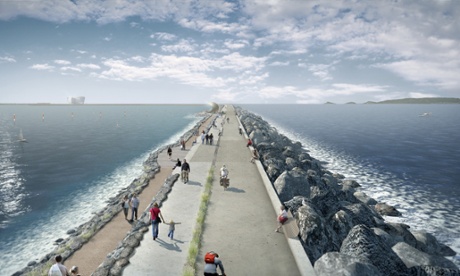
The company behind the world’s first tidal energy scheme at Swansea Bay in south Wales hopes to create 70,000 jobs in the construction phase alone, if it can roll the programme out to five other, larger schemes at a total cost of £30bn.
Tidal Lagoon Power, which received the green light in the budget to start talks with the government on subsidies, wants the £1bn Swansea project to be the start of a “game-changing” industry.
The company is looking at sites for a factory to assemble wave turbines in the wider Swansea area, while a tender for generators has already been awarded to General Electric in Rugby, Warwickshire. George Osborne announced a formal undertaking to open talks with Tidal Lagoon Power in his budget speech. The first project at Swansea Bay will generate 500 gigawatt-hours of electricity a year – enough for light and power for 120,000 homes – with turbines working 14 hours a day.
Ed Davey, energy and climate change secretary, said: “Britain has some of the best tidal resources in the world – tidal lagoons could provide 8% of our electricity needs, replacing foreign fossil fuels with clean, reliable, home-grown electricity and creating fantastic economic opportunities.”
The energy department will start negotiations on a “strike price” under the government’s “contracts for difference” mechanism, beginning at about £168 per megawatt-hour, although Poyry, an independent consultancy, believes it can be done for £150, falling to £92 for a third lagoon. That compares with a strike price of £92.50 for the planned Hinkley Point C nuclear plant in Somerset.
Greenpeace welcomed the move but said the UK’s renewable industry needed a long-term strategy, “not just a belated wink to green voters”.

